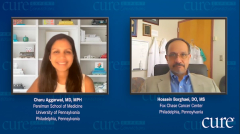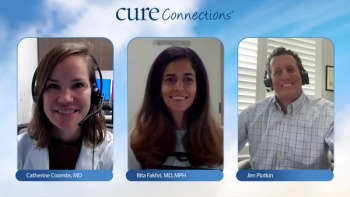
Individualized Treatment Decisions for Patients With NSCLC
The rationale for waiting on results of molecular testing prior to initiating treatment for patients with non-small cell lung cancer.
Episodes in this series

Charu Aggarwal, M.D., MPH: Hoss, I really liked your idea about recognizing the anxiety or urgency to treat, because I find that we can’t be purists. We have to personalize our treatment for the patient who’s sitting in front of us. We have to say, “I would love to get your biomarker testing, but if it means waiting for four weeks, that’s not something I’m willing to do.”
How do your patients react when you say that you’re going to wait for the results to come back, and that in your assessment it would be okay to wait another 10 days to get the results? How does that conversation go?
Hossein Borghaei, DO, MS: By nature, it’s a slightly more difficult conversation. It requires a lot of attention to details and describing and recognizing the person sitting in front of you and what they might need in terms of having a satisfactory answer as to why you recommend them waiting another 10 days. Usually I’m successful in explaining why I want to wait a little longer to get the data. But I always qualify it by saying, “If anything happens and there are more symptoms or concerns about progression of disease in that 10 days, I’m more than happy to start you on treatment with chemotherapy.” I will also explain why I don’t want to use immunotherapy, if that’s indicated. For the most part, I’ve been very successful in rationalizing and explaining the reasoning behind waiting for the molecular testing to come in.
I present it as not being a delay in treatment. I always say it’s like not having a CT scan and not knowing how much disease there is or where the disease is before we’re starting treatment. We would never want to do that because it might not be appropriate. It’s the same thing with molecular testing. We don’t want to do something that we’re going to regret three months down the road. So let’s take our time, get all the information that we need now, and proceed with a treatment that we all feel comfortable about, even if that means there is going to be a week or so delay in getting them started on treatment. Once the patients are assured of the fact that we’re not going to not follow them, we’re not going to not see them, and we’re going to pay attention to the symptoms and everything else, that allows us to have some time to get some of the molecular results back.
Charu Aggarwal, M.D., MPH: Absolutely. Sorry, Hoss, were you saying something?
Hossein Borghaei, DO, MS: It’s the same issue with the PD-L1 marker you alluded to. PD-L1 has become an important part of what we do because, unfortunately, the majority of our patients at this point don’t have a targeted option. So immunotherapy has become a huge component of what we do, and the results have been simply unbelievable. We now have five-year survival data with a single-agent checkpoint inhibitor in appropriate patients.
PD-L1 testing is another example of why we need to wait until we have all the information to decide whether we use a combination of chemotherapy plus a checkpoint inhibitor or a checkpoint inhibitor alone. That can make a huge difference in somebody’s quality of life. If you don’t have to have chemotherapy, that might be an attractive option to some of our patients. It all goes back to how good of a job we can do as clinicians in that initial visit of setting the stage, setting expectations, and talking about the importance of biomarkers. Because everything that follows is impacted by what we do in the frontline setting. That would be great.
Transcript edited for clarity.

